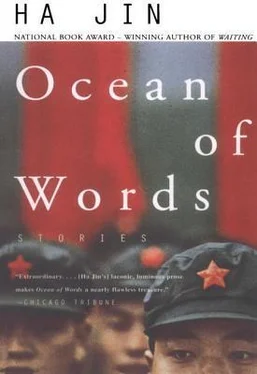One thing we all liked about the guarding job was that we could have some good food. In the beginning Chef Wang cooked a lot of grand dishes for Lev. Only Interpreter Zhang ate with him, and he explained to him the names of the dishes and the ways they were made. Certainly Lev had never tasted anything genuinely Chinese. If he liked a dish on the first try, he would eat it all without touching the other six or seven dishes. Wiping out the first one, he would move to attack the second, then the third, and then, if he still had room in his stomach, the fourth. Through the crack between the door and its frame, we saw Interpreter Zhang watching him amusedly in the dining room, and we all laughed at his barbarous manners.
During the first week, at every meal Lev left some dishes untouched, so we, eating after him, would have those dishes in addition to our stewed vegetables and sorghum or rice. Oh, I had never tasted things so good! The quails, the bear palms, the frog legs, the oysters, the salmon, everything seemed eager to jump into your mouth. But we had to be patient, since we would share the dishes. Officers and soldiers were equal, just as we were all brothers. Chef Wang was really a kind old man, and he would smile watching us gobble down everything he made. Probably, he sometimes cooked a lot for Lev on purpose so that we could have more untouched leftovers.
As there were more important people to be fed, Chef Wang couldn’t stay long to cook for Lev. There was no sense in treating an obscure Russian man like a state guest for good. In the beginning we fed him so well in hopes that he would cooperate and tell the officers whatever they wanted to know. He talked a lot indeed, and Scholar Wang always wrote down his words translated by Interpreter Zhang, but they could not figure out the credibility and value of what he said. So after three weeks Chef Wang left, and a cook was dispatched from the Divisional Headquarters. Though the new chef, Old Bi, did not cook as well as Chef Wang, he was good enough for Lev. Lev’s daily meal expenses remained seven yuan , while every one of us had only fifty-five fen a day. In terms of board expenses, Lev ate more than our whole squad. There was no way he could eat so much, so we still benefited from his leftovers. However, Lev was civilized now — he would first try everything, make a plan of operation, and then launch an all-out attack.
One day after lunch Lev came out of the dining room with a chicken leg in his hand. Mr. Zhang followed him, climbing the stairs while Lev kept chewing the meat. Passing a window in the hall, Lev threw the unfinished chicken leg outside. The interpreter saw it and started yelling at him in Russian. We didn’t understand what he said, but we could tell he was very angry. None of us could imagine such a quiet, kind man could go mad like that. After they were in their room, we still heard Mr. Zhang shouting. He thumped the table again and again. A few minutes later, Mr. Zhang came out, walking quickly across our large room, and went downstairs. In no time he returned with a pair of chopsticks and a bowl of cooked sorghum partly covered with stewed eggplant, which was our lunch. He hurried past us, panting hard, his thick goatee vibrating a little. After he entered their room, we heard the chopsticks striking the table. Immediately we gathered at their door, peeping at them through the cracks in the plank.
Lev sat on the edge of his bed, hanging his head low. His face was as purple as an eggplant. Mr. Zhang raised the bowl of sorghum to Lev’s face, and Lev turned his head away. Then Mr. Zhang went on talking loudly. It seemed he was teaching Lev a lesson — not to forget who he was, and to understand that some Chinese didn’t even have sorghum to eat. He took up the bowl and began to eat the food himself while continuing to talk to Lev. We never found out what he said. Our squad leader asked Mr. Zhang afterwards, but he was told to forget about it.
More than being respectful, Lev was sort of attached to his interpreter. Three weeks after Mr. Zhang had yelled at him, a Russian gunboat was sunk by the Chinese militia in Hutou. The Russians protested, and a border negotiation was arranged. Mr. Zhang was summoned to join the delegation as the interpreter. During his absence, a young interpreter named Jiao Mu, a recent graduate from Jilin Foreign Language School, came to accompany Lev. Lev seemed deliberately to make things difficult for Interpreter Jiao, pretending he didn’t understand Jiao’s Russian and constantly mentioning Mr. Zhang. Perhaps he meant to remind the young officer that he would never be as good as his predecessor. He even showed us how he missed Mr. Zhang — slapping his chest, saying “Zhang,” and jerking up his square thumb.
Every day Interpreter Jiao reported to Scholar Wang that Lev had asked when Mr. Zhang would be back, as though Lev had felt something ominous. It turned out that Mr. Zhang would never be back with him again. He died in Hutou right after the negotiation. When he had arrived at the county town, he felt a pain in his stomach, but he didn’t take it seriously; he just took some painkillers and set out with the delegation. Once they were in Russia, the pain grew intense. Because he was the only interpreter in our delegation, he had to be present at the talks, which were to last for a whole day with only a lunch break. During the morning negotiation, he swallowed one tablet after another and tried hard to interpret the dialogue. He came out of the hall sweating all over. While the other officers were having lunch, he lay on a sofa unable to move. The Russians sent for a doctor. The diagnosis was acute appendicitis, and Mr. Zhang needed an immediate operation. But the negotiations were to continue in the afternoon. Without our own interpreter, the talks would be controlled by the Russians and they would cheat us, and we might make some agreements in their favor, so Mr. Zhang struggled to his feet and worked until the meeting ended. Now the doctor said the patient must be operated upon, with absolutely no delay. The Russians offered to have Mr. Zhang taken to their hospital and after the operation they would send him back. Our chief delegate, Commissar Lin of our division, asked Mr. Zhang if he wanted to stay in Russia for a few days. Mr. Zhang refused, saying with tears in his eyes: “I will never have my illness cured … by our enemy. If I’m dying, please, please let me die in our Motherland!” So they drove him back to Hutou as fast as they could, but they stopped on the way again and again, finding the road flooded and two bridges washed away by mountain torrents. Desperate as they were, they couldn’t get to the headquarters of the Fifth Regiment until three in the morning. It was too late, and Mr. Zhang passed away.
He became our hero. The Political Department of Shenyang Military Region issued a general order that required all officers and soldiers to study Zhang Fan’s moving deeds and learn from his love for the Motherland and his unbreakable Chinese spirit. The newspaper Forwards described his life and his last moments in a full front-page article. When we read the paper, we couldn’t control our tears. He was awarded the First Class Merit Citation, and the Zhangs became a Revolutionary Martyr’s Family.
Though we all felt terrible about his death, none of us took it harder than Lev. Now he had to depend on Interpreter Jiao to translate Mr. Zhang’s story in the newspaper. The young interpreter spent a whole evening in the study putting the article into Russian. The next morning after breakfast, Lev read the article, and he cried loudly, as though his parents were dead. The whole building could hear him. He wailed for almost an hour. In fact, he later told Interpreter Jiao that Mr. Zhang had been like a father to him and had taught him a profound patriotic lesson. We had never thought Lev had a heart. That day he didn’t eat lunch.
Читать дальше











